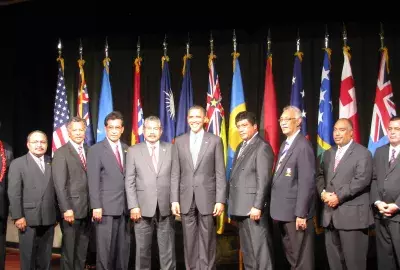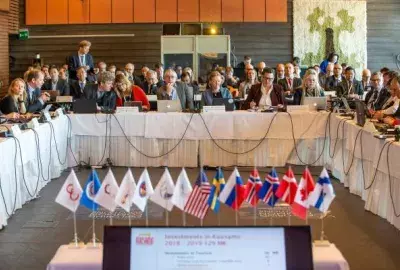Error message
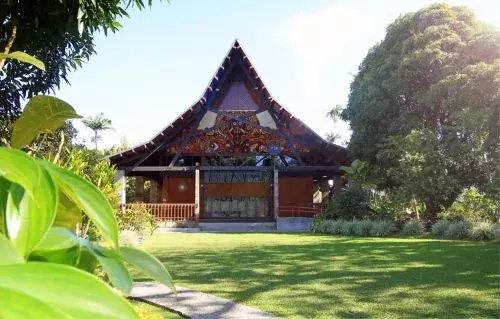
OFFICE/DEPARTMENT
HONOLULU (April 6, 2021) -- The dire climate change challenges now confronting the people of the Pacific Islands make the need for regional cooperation and solidarity greater than ever. Unfortunately, a regional political dispute threatens to divide island nation groupings at this critical time.
Finding ways to overcome these fissures, enhance multinational cooperation and promote future collaboration on environmental issues was at the heart of a recent East-West Center virtual workshop, “Strengthening Resilience, Cooperation, and Partnership in the Pacific.” Supported by the Government of Japan, the March 25 workshop convened academics, practitioners and policy professionals from Australia, Japan, New Zealand, Pacific Islands countries and the US with expertise in regional dynamics, compound climate threats and disaster recovery mechanisms pertinent to the region.
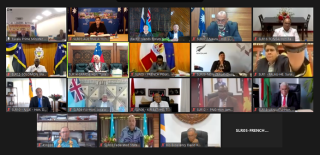
leaders held their annual meeting remotely in
early February. Photo: PIF via Facebook.
Regional Rift Dominates Discussion
Much of discussion during a panel on “Pacific Regionalism and Meeting Environmental Challenges” was focused on the recent decision of five Micronesian states to withdraw from the region’s primary multilateral body, the Pacific Islands Forum, or PIF, following a dispute over the election of the Forum’s Secretary-General.
Dr. Richard Herr, a parliamentary law expert at the University of Tasmania who has long been an advisor to Pacific Island governments, said that the current split will have both direct and indirect effects on multilateralism, but perhaps the most important impact will be on the networking system embedded in the Forum. “It's not widely appreciated that this is one of the few parts of the world where the member states don't have embassies with each other,” Herr said. “They rely on the regional system to provide them with the intergovernmental contacts to pursue regional interests and to express those interests internationally.”
Herr also noted that the PIF’s key role has not been capacity building, as is frequently said, but rather “capacity supplementation.” “The scientific, technocratic, and administrative skills have been warehoused in regional organizations that are owned largely by the island states,” he said, “and these are called upon as needed to supplement their national resources.”
This function, he said, has helped to maintain these states as viable and effective, “and it is what's going to help them meet their aspirations as they look at both the post-Covid world and dealing with all the problems we had before we got to Covid.”
Hope For a More Cohesive Future
Mr. Richard Pruett, a senior consultant at The Stevenson Group, a Washington, DC-based consultancy specializing in international development and security, noted that the value to the Micronesian governments of having a mission in Suva lies principally in the Fijian capital's role as a crossroads for Pacific Island countries. Without PIF membership, he warned, it might be harder for Micronesian governments to justify the expense of a mission in Suva.
A former US diplomat to six Pacific Island nations, Pruett believes the Micronesians might still rejoin the PIF under new arrangements that could even strengthen the Forum’s cohesion going forward. “My hope is that the forum is resilient enough to reform in such a way as to allow the Micronesian countries to rejoin, but this time on an equal footing with other Pacific Island countries,” he said. In the meantime, he expressed the hope that “the Micronesian countries will coordinate more among themselves, developing a stronger Micronesian identity all their own.”
Pruett suggested that this would be an opportune time for Washington to create an ambassador-at-large position for the Pacific and to use the East-West Center-based Pacific Island Conference of Leaders to re-engage the region. He also expressed his expectation that more US financial resources will soon be available to the region in general, and Micronesia in particular, both as a counterbalance to growing influence from China and as a way of forestalling increased Micronesian outmigration.
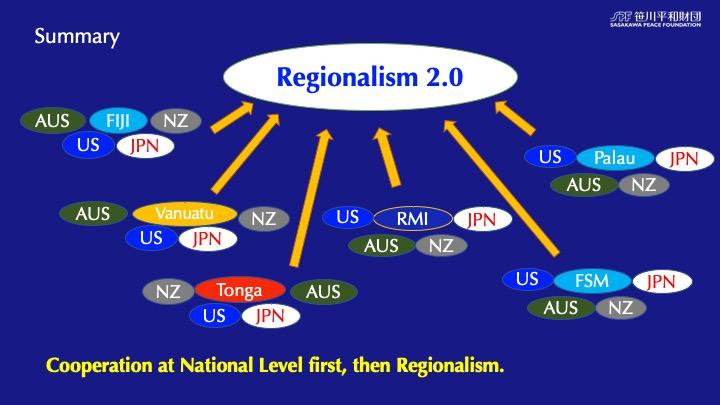
Matching Challenges and Priorities with Partner Nations
Taking a very different approach to addressing the challenges facing Pacific Island countries, Hideyuki Shiozawa, senior program officer for the Sasakawa Peace Foundation’s Pacific Island Nations Program, proposed an innovative "layered" multilateralism approach. He described this approach as using selective bilateralism, taking into account the different challenges, priorities and resources of each Pacific Island country and matching them with the individual strengths of international partners the US, Japan, Australia, and New Zealand. These nationally based groupings could then cooperate on a regional basis, which in turn could give them voice on the global stage, he said.
HONOLULU (April 6, 2021) -- The dire climate change challenges now confronting the people of the Pacific Islands make the need for regional cooperation and solidarity greater than ever. Unfortunately, a regional political dispute threatens to divide island nation groupings at this critical time.
Finding ways to overcome these fissures, enhance multinational cooperation and promote future collaboration on environmental issues was at the heart of a recent East-West Center virtual workshop, “Strengthening Resilience, Cooperation, and Partnership in the Pacific.” Supported by the Government of Japan, the March 25 workshop convened academics, practitioners and policy professionals from Australia, Japan, New Zealand, Pacific Islands countries and the US with expertise in regional dynamics, compound climate threats and disaster recovery mechanisms pertinent to the region.

leaders held their annual meeting remotely in
early February. Photo: PIF via Facebook.
Regional Rift Dominates Discussion
Much of discussion during a panel on “Pacific Regionalism and Meeting Environmental Challenges” was focused on the recent decision of five Micronesian states to withdraw from the region’s primary multilateral body, the Pacific Islands Forum, or PIF, following a dispute over the election of the Forum’s Secretary-General.
Dr. Richard Herr, a parliamentary law expert at the University of Tasmania who has long been an advisor to Pacific Island governments, said that the current split will have both direct and indirect effects on multilateralism, but perhaps the most important impact will be on the networking system embedded in the Forum. “It's not widely appreciated that this is one of the few parts of the world where the member states don't have embassies with each other,” Herr said. “They rely on the regional system to provide them with the intergovernmental contacts to pursue regional interests and to express those interests internationally.”
Herr also noted that the PIF’s key role has not been capacity building, as is frequently said, but rather “capacity supplementation.” “The scientific, technocratic, and administrative skills have been warehoused in regional organizations that are owned largely by the island states,” he said, “and these are called upon as needed to supplement their national resources.”
This function, he said, has helped to maintain these states as viable and effective, “and it is what's going to help them meet their aspirations as they look at both the post-Covid world and dealing with all the problems we had before we got to Covid.”
Hope For a More Cohesive Future
Mr. Richard Pruett, a senior consultant at The Stevenson Group, a Washington, DC-based consultancy specializing in international development and security, noted that the value to the Micronesian governments of having a mission in Suva lies principally in the Fijian capital's role as a crossroads for Pacific Island countries. Without PIF membership, he warned, it might be harder for Micronesian governments to justify the expense of a mission in Suva.
A former US diplomat to six Pacific Island nations, Pruett believes the Micronesians might still rejoin the PIF under new arrangements that could even strengthen the Forum’s cohesion going forward. “My hope is that the forum is resilient enough to reform in such a way as to allow the Micronesian countries to rejoin, but this time on an equal footing with other Pacific Island countries,” he said. In the meantime, he expressed the hope that “the Micronesian countries will coordinate more among themselves, developing a stronger Micronesian identity all their own.”
Pruett suggested that this would be an opportune time for Washington to create an ambassador-at-large position for the Pacific and to use the East-West Center-based Pacific Island Conference of Leaders to re-engage the region. He also expressed his expectation that more US financial resources will soon be available to the region in general, and Micronesia in particular, both as a counterbalance to growing influence from China and as a way of forestalling increased Micronesian outmigration.

Matching Challenges and Priorities with Partner Nations
Taking a very different approach to addressing the challenges facing Pacific Island countries, Hideyuki Shiozawa, senior program officer for the Sasakawa Peace Foundation’s Pacific Island Nations Program, proposed an innovative "layered" multilateralism approach. He described this approach as using selective bilateralism, taking into account the different challenges, priorities and resources of each Pacific Island country and matching them with the individual strengths of international partners the US, Japan, Australia, and New Zealand. These nationally based groupings could then cooperate on a regional basis, which in turn could give them voice on the global stage, he said.
Web Article
Recent online articles and analysis that have been published on the East-West Center website.






